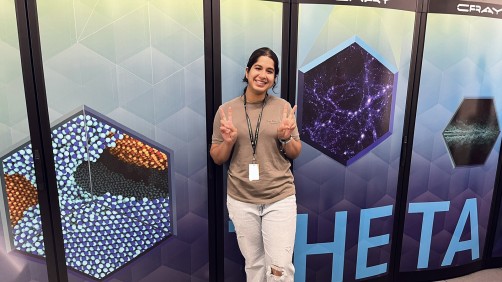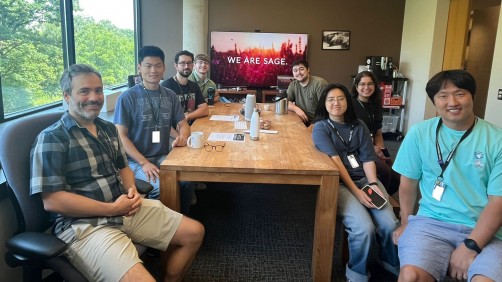Newswise — When Akshata and Anagha Tiwari, two sisters studying at the University of Illinois Urbana-Champaign, attended a STEM (science, technology, engineering and mathematics) research symposium at the university in 2022, they already had firsthand experience with the U.S. Department of Energy’s (DOE) Argonne National Laboratory. In high school, both attended Argonne’s Big Data Camp – a workshop where high school juniors and seniors apply real research data to develop the professional skills and perspective of data scientists. Now, they were about to learn of a new opportunity at Argonne.
While at the symposium, the sisters met a student STEM ambassador from Argonne, Alice Gao. She presented the research she developed during her Science Undergraduate Laboratory Internships (SULI) at Argonne, and encouraged the sisters to try the program, offering tips on how to apply. A year later, Gao encountered the sisters again while waiting for a bus at their university. They happily told her that her advice to them had paid off: they were now SULI summer interns at Argonne, continuing their STEM journey with the institution.
“My experiences with Argonne have connected in meaningful ways because each program has led to the other and continued to build upon my interest and eagerness to continue researching in the future,” said Akshata, who is continuing her work with Argonne as a research aide into the school year after completing her SULI appointment. “The internship was a true extension of the Big Data Camp, and I really could not be happier with the skills, experiences and confidence I gained as a result of both programs.”
Akshata and Anagha, who is likewise continuing at Argonne as a visiting student, are just a few examples of STEM-passionate students who first connected with Argonne in high school (or earlier) and have remained engaged in Argonne programming even as they advance into college and beyond. They demonstrate the effectiveness of Argonne’s diverse, multi-level STEM education programs, designed to combine as pathways to support and guide students’ STEM journeys.
“My experiences with Argonne have connected in meaningful ways because each program has led to the other and continued to build upon my interest and eagerness to continue researching in the future. The internship was a true extension of the Big Data Camp, and I really could not be happier with the skills, experiences and confidence I gained as a result of both programs.” — Akshata Tiwari, SULI intern and research aide
“My experiences with Argonne have connected in meaningful ways because each program has led to the other and continued to build upon my interest and eagerness to continue researching in the future. The internship was a true extension of the Big Data Camp, and I really could not be happier with the skills, experiences and confidence I gained as a result of both programs.” — Akshata Tiwari, SULI intern and research aide
“My sincere passion for computer science and statistics solidified during the Big Data Camp,” said Anagha. As a SULI intern, she worked on Argonne’s Software-Defined Sensor Network (SAGE) project. “Working with the SAGE team has made me realize the wide variety of applications in computing, and how machine learning can be combined with environmental science, health care, climate challenges and more.”
As they continue to build on their Argonne experiences in their new positions at Argonne and elsewhere, the interns are also applying their research to other academic and professional avenues. For instance, Anagha intends to publish a paper based on her research, hoping to submit it to multiple journals and a conference.
“It was quite impressive to me that she is willing to keep working on the project, and is anticipating publishing her work,” said Seongha Park, an assistant computer scientist who mentored Anagha in her SULI internship. “At the final presentation, we could see her confidence in her work. I believe this internship, and her new research aide position, will expand her horizons as a researcher and can serve as a solid career milestone.”
This work was supported in part by DOE, Office of Science, Office of Workforce Development for Teachers and Scientists (WDTS).
Argonne National Laboratory seeks solutions to pressing national problems in science and technology. The nation’s first national laboratory, Argonne conducts leading-edge basic and applied scientific research in virtually every scientific discipline. Argonne researchers work closely with researchers from hundreds of companies, universities, and federal, state and municipal agencies to help them solve their specific problems, advance America’s scientific leadership and prepare the nation for a better future. With employees from more than 60 nations, Argonne is managed by UChicago Argonne, LLC for the U.S. Department of Energy’s Office of Science.
The U.S. Department of Energy’s Office of Science is the single largest supporter of basic research in the physical sciences in the United States and is working to address some of the most pressing challenges of our time. For more information, visit https://energy.gov/science.





